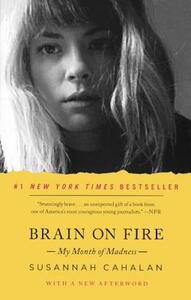You need to sign in or sign up before continuing.
Take a photo of a barcode or cover
Okay so I needed some time to think about this novel and here is why I liked it so much:
-It scared me in a way I didn't think was possible. I can't even begin to imagine what I would do if I was in Susannah's shoes. To be perfectly normal and then completely lose your mind is not something that is easy to deal with.
-I loved her narrative of her experience and how it started small but then turned into this entirely bizarre experience. It literally made my skin crawl.
-The technical side of this book was amazing. I mean I was absolutely drawn to all the psychological and medical terms that she used. I heard of some of them before, but this book definitely pushed me to do research of my own.
-I loved the fact that she made us question the medical field in the sense that a lot of doctors are overworked and don't have the time to give each patient thorough examinations. It illustrates how so many diseases go unnoticed or become misdiagnosed.
-I loved hearing about her recovery as much as I loved reading about the initial onset of the disease. It amazed me that her brain went through so much but was some how able to repair itself.
If you guys are definitely looking for a non-fiction book based in psychology I would definitely check this one out.
-It scared me in a way I didn't think was possible. I can't even begin to imagine what I would do if I was in Susannah's shoes. To be perfectly normal and then completely lose your mind is not something that is easy to deal with.
-I loved her narrative of her experience and how it started small but then turned into this entirely bizarre experience. It literally made my skin crawl.
-The technical side of this book was amazing. I mean I was absolutely drawn to all the psychological and medical terms that she used. I heard of some of them before, but this book definitely pushed me to do research of my own.
-I loved the fact that she made us question the medical field in the sense that a lot of doctors are overworked and don't have the time to give each patient thorough examinations. It illustrates how so many diseases go unnoticed or become misdiagnosed.
-I loved hearing about her recovery as much as I loved reading about the initial onset of the disease. It amazed me that her brain went through so much but was some how able to repair itself.
If you guys are definitely looking for a non-fiction book based in psychology I would definitely check this one out.
I really enjoyed the journalistic style of writing for the first 60% or so of this book. Cahalan really transports you into her world of paranoia and trauma and makes you want to keep reading. She does this with extreme objectivity and resists passing judgement far more than most of us would be able. Interestingly, the reason I love the first half(ish) of the book, is the reason I enjoyed the second half(ish) less. Because Cahalan is so objective and journalistic in her writing style, her recovery seems to be more a recitation of events rather than a true reflection with broader themes or lessons intertwined. Her observations and research is stunning, especially considering how little she remembers from this time in her life, but I would've like a bigger take away from the author at the end. One final note, this book pushed me to think a lot about what would have or DOES happen to individuals without Cahalan's support network and social/capital resources. I shudder to imagine what happens when instead it is a poor, isolated single mother without medical coverage. How would this be different if it were a man? How would this be different if nobody has your back? This book really made me think...
I can’t get over the fact that while discussing the patient sharing a room with her, all she had to say about the other patient was that she was obese. Lame.
In all fairness, I liked the book, but didn't love it. Towards the beginning of the book the author had my interest piqued, but towards the middle it just started feeling repetitive, and being as she was a journalist, her writing resembled that of a journalist. I didn't get that feeling I usually get when I read a memoir or biography. They're my absolute favorites.
We start off with the author telling us about her awesome new job at The Post and her new relationship. But, she notices something is wrong with her. She starts noticing all these symptoms and weird things happening to her. When they finally get to diagnose her with a rare auto-immune disease known as: "anti-NMDA-receptor autoimmune encephalitis". She takes us through her journey dealing with this disease as well as her journey to healing. It was written very well. Using medical terminology and lingo to describe what was going on. I will not deny the book was very good, just wish it had the little bit of umph that I usually get when reading a memoir as I stated earlier.
We start off with the author telling us about her awesome new job at The Post and her new relationship. But, she notices something is wrong with her. She starts noticing all these symptoms and weird things happening to her. When they finally get to diagnose her with a rare auto-immune disease known as: "anti-NMDA-receptor autoimmune encephalitis". She takes us through her journey dealing with this disease as well as her journey to healing. It was written very well. Using medical terminology and lingo to describe what was going on. I will not deny the book was very good, just wish it had the little bit of umph that I usually get when reading a memoir as I stated earlier.
This book is a very well-written memoir about a terrifying experience with a rare infection. The author recovers because her doctor happens to know someone doing research on the infection she has.
Brain on Fire is about a young woman who suffers from an unnamed disease, loosing patches of her memory and cognitive function, and her road to diagnosis and recovery. I found her medical diagnosis intriguing and that was probably my favorite part about the book. I would’ve happily read more chapters on it if I could’ve. But otherwise I was a bit underwhelmed. I’ve become a big fan of memoirs when they’re enlightening on the fragility and blessings of life. This book lacked that self-reflection for me.
In the memoir Brain on Fire, Susannah Cahalan details her struggle to get an accurate diagnosis for why she has suddenly been having symptom that resemble mental illness or signs of a stroke. She leaves the reader guessing as to what the correct diagnosis might be until the last third of the book. So many times I was tempted to flip ahead to see what it was!
Susannah’s story is surprisingly detailed given that she cannot remember a lot of the events that happened in her “month of madness”. Luckily, she is a journalist and was skilled at interviewing her family, friends and doctors about what happened.
One of the most important take-ways from this book is to be your own advocate in your health care. As a frequent patient myself, I heartily second that. Never be afraid to question your doctor and do your own research.
I definitely recommend this book.
Susannah’s story is surprisingly detailed given that she cannot remember a lot of the events that happened in her “month of madness”. Luckily, she is a journalist and was skilled at interviewing her family, friends and doctors about what happened.
One of the most important take-ways from this book is to be your own advocate in your health care. As a frequent patient myself, I heartily second that. Never be afraid to question your doctor and do your own research.
I definitely recommend this book.
I found this title on a list of recommended "scary" reads for Halloween, and although the illness and its effects were terrifying, it wasn't quite what I expected.
4* for the story, minus .5* for the kind of chirpy narrator, so 3.75*.
5h 43m, 288p
4* for the story, minus .5* for the kind of chirpy narrator, so 3.75*.
5h 43m, 288p
Piecing together a month and change of a medical mystery through her own memories, videos from the hospital, medical records, interviews with loved ones, and her father's diary, journalist Susannah Cahalan recounts an experience of mental anguish and the cause behind it all.
Compelling and intimate, Cahalan lets readers into a rare scene, made rarer by the cause for her madness. As she recounts the days she marks as beginning her descent to psychotic behavior that alternated between mania and depression, Cahalan explores the nature of her state, disconnected from reality and beyond. As a medical memoir, the nitty-gritty of her story is often left to simplistic descriptions in favor of the emotional story of the memoir. Cahalan also writes with frequent humbleness, noting the sacrifices her family and other loved ones made for her during her harrowing experience and the suffering they encountered as they not only worried for her but faced the accusatory and often cruel turns of her paranoia and disdain driven by her temporary mental illness. With Cahalan's background in journalism, she has a natural advantage with writing. Her prose is generally clear and effective, though occasional timeline jumps can make the big picture a little confusing. Regardless, the fascinating narrative and Cahalan's emotional journey (and that of her loved ones) makes this compulsively digestible and easy to get stuck on for a day or two.
Compelling and intimate, Cahalan lets readers into a rare scene, made rarer by the cause for her madness. As she recounts the days she marks as beginning her descent to psychotic behavior that alternated between mania and depression, Cahalan explores the nature of her state, disconnected from reality and beyond. As a medical memoir, the nitty-gritty of her story is often left to simplistic descriptions in favor of the emotional story of the memoir. Cahalan also writes with frequent humbleness, noting the sacrifices her family and other loved ones made for her during her harrowing experience and the suffering they encountered as they not only worried for her but faced the accusatory and often cruel turns of her paranoia and disdain driven by her temporary mental illness. With Cahalan's background in journalism, she has a natural advantage with writing. Her prose is generally clear and effective, though occasional timeline jumps can make the big picture a little confusing. Regardless, the fascinating narrative and Cahalan's emotional journey (and that of her loved ones) makes this compulsively digestible and easy to get stuck on for a day or two.






